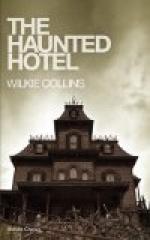Descending to particulars, each member of the club contributed his own little stock of scandal to the memoirs of the Countess. It was doubtful whether she was really, what she called herself, a Dalmatian lady. It was doubtful whether she had ever been married to the Count whose widow she assumed to be. It was doubtful whether the man who accompanied her in her travels (under the name of Baron Rivar, and in the character of her brother) was her brother at all. Report pointed to the Baron as a gambler at every ‘table’ on the Continent. Report whispered that his so-called sister had narrowly escaped being implicated in a famous trial for poisoning at Vienna—that she had been known at Milan as a spy in the interests of Austria—that her ‘apartment’ in Paris had been denounced to the police as nothing less than a private gambling-house— and that her present appearance in England was the natural result of the discovery. Only one member of the assembly in the smoking-room took the part of this much-abused woman, and declared that her character had been most cruelly and most unjustly assailed. But as the man was a lawyer, his interference went for nothing: it was naturally attributed to the spirit of contradiction inherent in his profession. He was asked derisively what he thought of the circumstances under which the Countess had become engaged to be married; and he made the characteristic answer, that he thought the circumstances highly creditable to both parties, and that he looked on the lady’s future husband as a most enviable man.
Hearing this, the Doctor raised another shout of astonishment by inquiring the name of the gentleman whom the Countess was about to marry.
His friends in the smoking-room decided unanimously that the celebrated physician must be a second ‘Rip-van-Winkle,’ and that he had just awakened from a supernatural sleep of twenty years. It was all very well to say that he was devoted to his profession, and that he had neither time nor inclination to pick up fragments of gossip at dinner-parties and balls. A man who did not know that the Countess Narona had borrowed money at Homburg of no less a person than Lord Montbarry, and had then deluded him into making her a proposal of marriage, was a man who had probably never heard of Lord Montbarry himself. The younger members of the club, humouring the joke, sent a waiter for the ‘Peerage’; and read aloud the memoir of the nobleman in question, for the Doctor’s benefit— with illustrative morsels of information interpolated by themselves.
’Herbert John Westwick. First Baron Montbarry, of Montbarry, King’s County, Ireland. Created a Peer for distinguished military services in India. Born, 1812. Forty-eight years old, Doctor, at the present time. Not married. Will be married next week, Doctor, to the delightful creature we have been talking about. Heir presumptive, his lordship’s next brother, Stephen Robert, married to Ella, youngest daughter of the Reverend




